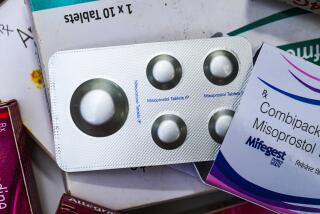Panel Defeats Bill Benefiting Maker of Brand-Name Drug
- Share via
SACRAMENTO — A national manufacturer of name-brand drugs lost a major battle for economic turf Wednesday when a legislative committee defeated a bill that would have made the substitution of certain less costly generic drugs more difficult.
The bill would have made it tougher for low-cost generic versions of “narrow therapeutic index” medications to reach patients in the vast California market. It would have particularly affected sales of Coumadin, a widely prescribed blood thinner made exclusively by DuPont Merck for 40 years.
Among other things, the bill would have required generic versions of narrow therapeutic index drugs that had been approved by the federal Food and Drug Administration to undergo more rigorous testing by the California Department of Health Services. It also would have forbidden pharmacists to substitute generic narrow therapeutic index drugs for name-brand drugs without the consent of physicians and patients.
Now, such substitutions are allowed unless physicians specifically order pharmacists not to make the substitution.
The narrow therapeutic index name applies to drugs for which the margins of tolerance are so narrow that too large a dose can be lethal while too small a dose can be wholly ineffective. Such drugs are used to treat heart disease, epilepsy, asthma, stroke and a variety of other serious health problems.
The bill was sponsored by DuPont Merck Pharmaceutical Inc., the maker of Coumadin. It was opposed by Barr Laboratories, the manufacturer of a generic substitute, warfarin sodium, that received approval from the FDA in March as a substitute for Coumadin.
In California, Coumadin sales are estimated at $40 million to $50 million a year. The Medi-Cal system, a major consumer of generic drugs, last year spent $6.1 million on Coumadin.
The plan, carried by Sen. Hilda Solis (D-El Monte), failed on a 4-0 vote of the Senate Health and Human Services Committee, one short of the five votes needed for approval.
Aides to Solis said she would seek to revive the bill next week, usually an uphill struggle.
Defeat of the bill (SB 1181) occurred after weeks of heavy lobbying by the rival pharmaceutical companies, managed health organizations, physicians and others.
Veteran committee Chairwoman Diane Watson (D-Los Angeles) and Solis tried at the last minute to devise a compromise by virtually stripping the bill of its key provisions. The compromise attempt never lifted off.
DuPont Merck, warning of potential hazards to patients of the generic substitute, has launched a state-by-state campaign to make access to Barr’s drug more difficult.
Barr claimed that DuPont Merck was trying to protect its 40-year-old monopoly, a charge denied by DuPont Merck. In turn, DuPont Merck suggested that patient safety could be jeopardized by generics, a claim denied by Barr.
At the hearing, Watson said she was aware of the fight for market share between the two firms, but said she wanted no part of it. She said patient protection was her top priority.
With Solis’ acceptance, Watson then began stripping from the bill “negative” features opposed by Barr and others, including a requirement that the health department periodically warn physicians and druggists that generic narrow therapeutic index drugs can be “toxic or subtherapeutic.”
Kathleen Jaeger, representing Barr Laboratories and other generic drug manufacturers, complained that such warnings threatened to put generic manufacturers out of business because doctors and druggists would never dispense such medications.
“You are going to see a lot of malpractice suits filed against pharmacists and physicians based on this,” she said. “This advisory is going to have a chilling effect and is based on no scientific evidence.”
Watson agreed that several such assertions were unproven and did not belong in the bill. She proposed a vague amendment requiring all sides to work out an acceptable list of do’s and don’ts for doctors, druggists and patients.
But the compromise failed to persuade the committee and the bill failed.
More to Read
Get the L.A. Times Politics newsletter
Deeply reported insights into legislation, politics and policy from Sacramento, Washington and beyond. In your inbox twice per week.
You may occasionally receive promotional content from the Los Angeles Times.










